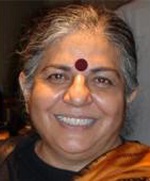The Green Interview:
Silver Donald Cameron Speaks With Vandana Shiva
Scientist, philosopher, feminist, author, environmentalist, activist, Dr. Vandana Shiva is a one-woman movement for peace, sustainability, and social justice. In the 1970s, she was one of the original tree huggers – a Chipko group of Indian women who surrounded trees to prevent them from being felled. Since then, she has become a passionate opponent of globalization and the irresponsible use of biotechnology and genetic engineering, especially in agriculture, and an equally passionate advocate for bioethics, ecofeminism, and biodiversity.

Silver Donald Cameron |
Dr. Shiva is the founder of the Research Foundation for Science, Technology and Ecology and of the organic farming program Navdanya. She is the author of nearly 20 books on the subjects of bio-piracy, ecofeminism, and earth democracy. Among her many honors is the Right Livelihood Award, also known as the Alternative Nobel Prize, for her work in placing women and ecology at the center of the international development of gender. I spoke with Vandana Shiva in Thimphu, Bhutan in December 2009.
Silver Donald Cameron:
It’s a great pleasure to meet you. I wanted to focus on the environmental aspect of your work. I was struck by one of your quotations, which said “You are not Atlas, carrying the world on your shoulder. It is good to remember that the planet is carrying you.”
Dr. Vandana Shiva:
Well, I’ve felt that very often we underestimate the power of Nature and we overestimate our contribution even when you’re trying to save the planet. We burden ourselves, we suffer under the burden, and that image of Atlas carrying the world is, in a way, a very real psychological experience for many activists.
Cameron:
That’s very true. It’s nice to be reminded that probably we are not as important as we think we are.

Vandana Shiva |
Shiva:
Exactly. I think we’ve got to do the right thing, not because we are important, but because the only way to live is to do the right thing. Not because it’s a grand thing. Not because Gaia is waiting for your little bit. She can get along very well without us.
Cameron:
It seems to me that if I had to summarize what I’ve known about your work in the field of ecofeminism, it really is that women have often suffered the brunt of the environmental disasters much more than men have. Could you talk a little about that?
Shiva:
The first movement that I became a part of was a movement for Chipko. Women in my region – what is now Uttarakhand – came out and said you can’t cut these trees because deforestation is destroying our sources of water, robbing us of food and water, and creating landslides. It’s all a huge burden on us and a threat to our very survival. They said we will hug the trees before you can cut the trees, so you will have to kill us before you kill the tree. It was a beautiful demonstration of the Gandhian concept of sacrifice in order to defend what must be defended.
The movement was called Chipko because chipko means to hug. It’s the women who came out. The men could be bribed for a little bit of money to cut down the tree and a bit of alcohol. But the women stuck to their guns and I remember a particular village where the head man of the village wanted to cut the forest and the wife was there with the women saying “No, we will hug these trees so you cannot cut the forest.” I think the reason women come out more strongly for ecological action and environmental protection – protection of the planet – is first because they do bear the worst burden and they are the canaries in the coal mine. Sustenance comes from Nature, therefore, the destruction of Nature turns into a threat to their role.
I think there’s a second deeper reason, which I’m getting more and more convinced about. I think because women were left out of privilege – we were the dominated, excluded, subjugated, and we weren’t part of the privilege of the monoculture of the mind. We weren’t part of the privilege of the mechanistic view of the world. We weren’t part of the privilege of thinking that Nature is dead. In our heads and in our hearts, we maintain the idea that Nature’s living, she’s Gaia, she’s our mother, that everything is connected and every action has consequence. That’s why women’s knowledge becomes so vital in our time because this is the kind of knowledge for ecological recovery.
Cameron:
Do you think that’s the case with western women as well? I can certainly see it in many of the developing nations, but I’m not quite so sure that would be true of the women in the United States and Canada.
Shiva:
I do university talks. Twice a year, I will go to North America. More and more young women who might never, ever have had a rural background will come with my book Staying Alive and say this is what has changed my life. I think people understand and young people understand that something is very wrong with the way the world has been structured. They understand that going down this way means total annihilation of our species and a very violent destruction of the conditions of life on this planet. I think it’s that deep awareness that they are getting from other sources – from the analysis of the climate treaty, the detail of the pollution of rivers, and the disappearance of jobs as Wall Street collapses. Then, on their own, they are making connections and asking, “What’s the way out?” The only way out is recognizing that the same world view that dominated Nature, dominated women. It did it for greed and power and control and we need to leave that behind us and move into another paradigm where we see partnerships, we see cooperation, and we see horizontal relationships rather than vertical dominations as the way forward.
I do feel even in the West, women who are not like the women of Chipko – carrying firewood on their backs – still understand eco-feminism. You wouldn’t believe it. I gave an annual lecture to the University of Bologna in Italy and a seven-year-old boy had come with this mother. He couldn’t speak English but had read parts of my book in Italian. He wanted to be introduced to me and had his mother translate it for me. He said, “I am an eco-feminist.” When seven-year-old European boys start to become eco-feminists, something is shifting.
To see this full one-hour interview (in video, audio or transcript), go to www.TheGreenInterview.com and sign up for a free one-week subscription. The site offers more than sixty in-depth interviews with environmental giants from around the world. Silver Donald Cameron, host and executive producer at The Green Interview, is one of Canada’s most respected authors and broadcasters. The Living Beach, his classic book on the ecology of shorelines, has been re-issued by Red Deer Press. This interview was published in Natural Life Magazine in 2014.
|

